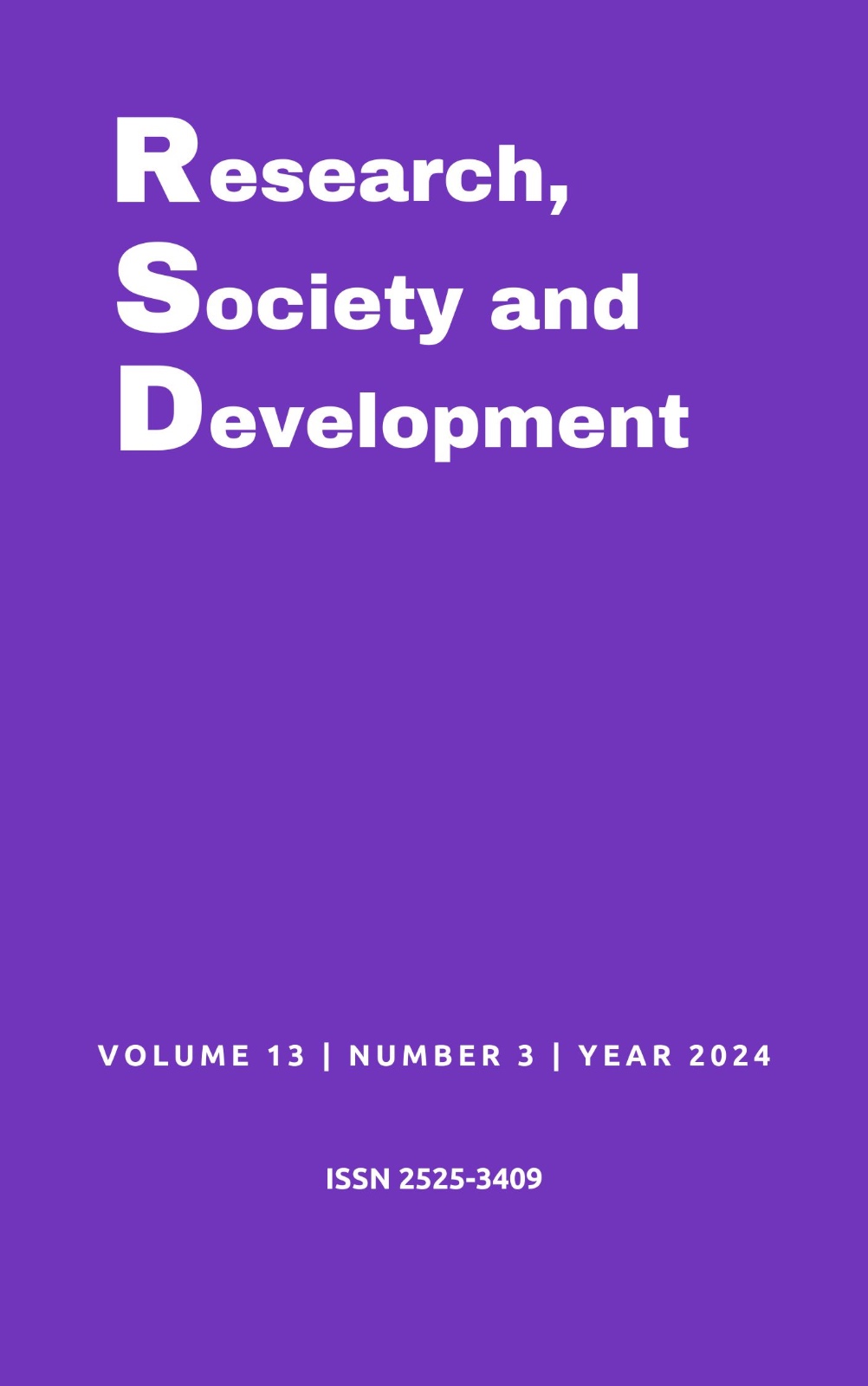School mini-garden as tools for environmental education at the Santo Antônio municipal school, Grajaú, State of Maranhão (MA), Brazil
DOI:
https://doi.org/10.33448/rsd-v13i3.45234Keywords:
Alternative teaching methodology, Socio-environmental responsibility, Sustainability.Abstract
Environmental Education plays an important role in the interaction between society and nature. Thus, the object of study of this work was the implementation of a mini-garden at Escola Municipal Santo Antônio, Grajaú-MA. The objective of the research was to investigate the potential of the mini-garden as an educational tool to promote environmental education, encouraging students to grow and consume healthy food. The research's methodological approaches were qualitative research and action research, using participant observation, the application of closed questionnaires and the practice of didactic sequences as ways of obtaining data. The results indicate that students at the researched school recognize the importance of preserving nature and the environment, demonstrating the effectiveness of the mini-garden as an educational tool in promoting environmental and interdisciplinary education, in which students can explore scientific and empirical concepts, and, add issues related to healthy eating. The Environmental Education approach based on the interaction of theory and practice stimulates students' interest and makes learning more meaningful. In this context, the students surveyed were motivated and willing to participate in activities related to the implementation of the mini-garden. Therefore, this study highlights the relevance of Environmental Education in the training of individuals, highlighting the importance of the school mini-garden as an instrument for teaching and learning and for socio-environmental awareness.
References
Aguiar, P. C. B. d., Costa Neto, R. F., Bruno, N. L., & Profice, C. C. (2017). Da teoria à prática em educação ambiental. Revista Gestão & Sustentabilidade Ambiental, 6(2), 111-132. https://doi.org/10.19177/rgsa.v6e22017111-132.
Azevedo, L. V., Alexandrino, S. A., da Silva, J. L. M., & Costa, D. R. T. R. (2017). Educação Ambiental e Legislação: Reflexões sobre participação e efetividade. Revista Brasileira de Educação Ambiental (RevBEA), 12(2), 284-295.
Coelho, D. E. P. & BÓGUS, C. M. (2016). Vivências de plantar e comer: a horta escolar como prática educativa, sob a perspectiva dos educadores. Saúde Sociedade. São Paulo, 25, (3), p.761-771.
Costa, C. A. G., Souza, J. T. A. & Pereira, D. D. (2015). Horta escolar: Alternativa para promover Educação Ambiental e desenvolvimento sustentável no Cariri Paraibano. Polêmica. Rio de Janeiro. 5 (3). 001–009. https://doi.org/10.12957/polemica.2015.19350.
Enisweler, K. C. (2017). Hortas escolares nos anos iniciais do ensino fundamental: contribuições para o ensino de ciências. Cascavel. 136. https://tede.unioeste.br/handle/tede/3367.
Foladori, G. (1999). O capitalismo e a crise ambiental. Raízes: Revista de Ciências Sociais e Econômicas. (19), 31–6. https://doi.org/10.37370/raizes.1999.v.150. Republicado em: http://www.egov.ufsc.br/portal/conteudo/o-capitalismo-e-crise-ambiental.
Gadotti, M. (2008). Educar para uma vida sustentável. Educação para o desenvolvimento sustentável. Pátio Revista Pedagógica. (46), 12–5.
Geradi, W. A. (2018). Uma proposta de educação ambiental para alunos do ensino fundamental II por meio da criação de uma mini horta. Trabalho de Conclusão de Curso, 35-35.
González, F. E. (2020). Reflexões sobre alguns conceitos da pesquisa qualitativa. Revista Pesquisa Qualitativa. 8 (17), 155-83.
Marconi, M. D. A., & Lakatos, E. M. (2012). Técnicas de pesquisa: planejamento e execução de pesquisas, amostragens e técnicas de pesquisa, elaboração, análise e interpretação de dados. In Técnicas de pesquisa: planejamento e execução de pesquisas, amostragens e técnicas de pesquisa, elaboração, análise e interpretação de dados. Atlas, 7 ed. 277-277.
Marcomin, F. E., & Sato, M. (2016). Percepção, paisagem e educação ambiental: uma investigação na região litorânea de Laguna-SC, Brasil. Educação em revista, 32, 159-186.
Oliveira, F., Pereira, E. & Júnior, A. P. (2018). Horta escolar, Educação Ambiental e a interdisciplinaridade. Revista Brasileira de Educação Ambiental (RevBEA). 13 (2), 10-31.
Pavnoski, L., Hilger, T. R., & Pavnoski, F. L. (2021). A tecnologia digital e as metodologias alternativas: ferramentas para a promoção da aprendizagem significativa no ensino de ciências. Brazilian Journal of Development, 7(6), 56701-56712.
Polli, A., & Signorini, T. (2012). A inserção da educação ambiental na prática pedagógica. Ambiente & Educação: Revista de Educação Ambiental, 17(2), 93-102.
Lima, G. F. D. C. (2009). Educação ambiental crítica: do socioambientalismo às sociedades sustentáveis. Educação e Pesquisa, 35, 145-163.
Ramos, C. de A., Moraes, L. A., Santos, L. A. dos, & Veras, M. de F. (2018). Horta escolar: uma alternativa de Educação Ambiental, Alcântara (MA). Revista Brasileira De Educação Ambiental (RevBEA), 13(4), 228–247. https://doi.org/10.34024/revbea.2018.v13.2570.
Santana, L. M. S., Marruda, R., Valmeida, L. I. M. & Maciel, C. M. L. (2014). A Horta Escolar como Recurso no Ensino de Ciências na Perspectiva da Aprendizagem Significativa. Revista Ciências Exatas Tecnologia,9 (9), 37-45.
Santos, B. F. (2021). A merenda que educa. Revista Semiárido De Visu, 9(2), 159–169. https://doi.org/10.31416/rsdv.v9i2.244.
Severino, A. J. (2013). Metodologia do trabalho científico. Cortez. 274-274.
Sousa, G. L., de Medeiros de, A. B., Mendonça, M. J. D. S. L., & de Oliveira, I. P. (2011). A Importância da educação ambiental na escola nas séries iniciais. Revista Eletrônica Faculdade Montes Belos, 4(1). Publicado em: https://www.bibliotecaagptea.org.br.
Downloads
Published
Issue
Section
License
Copyright (c) 2024 Felipe Barros Lima; Cynthia Lohanne Lima de Sousa; Jakelline Nascimento Campelo; Weslley Carvalho Lima; Juliana Noronha Fonseca; Neusani Oliveira Ives Felix

This work is licensed under a Creative Commons Attribution 4.0 International License.
Authors who publish with this journal agree to the following terms:
1) Authors retain copyright and grant the journal right of first publication with the work simultaneously licensed under a Creative Commons Attribution License that allows others to share the work with an acknowledgement of the work's authorship and initial publication in this journal.
2) Authors are able to enter into separate, additional contractual arrangements for the non-exclusive distribution of the journal's published version of the work (e.g., post it to an institutional repository or publish it in a book), with an acknowledgement of its initial publication in this journal.
3) Authors are permitted and encouraged to post their work online (e.g., in institutional repositories or on their website) prior to and during the submission process, as it can lead to productive exchanges, as well as earlier and greater citation of published work.


